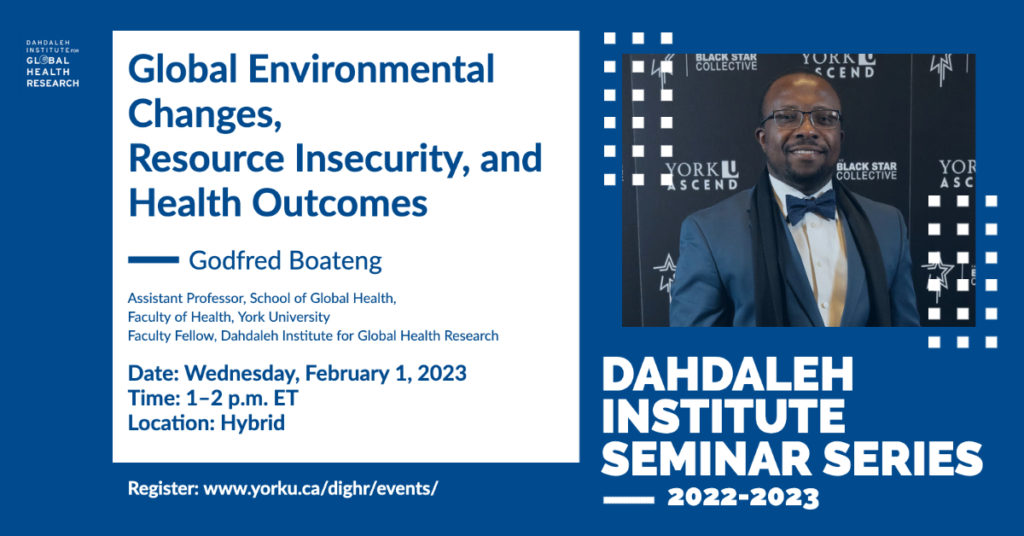Global Environmental Changes, Resource Insecurity and Health Outcomes, with Godfred Boateng
Global environmental changes have become critical determinants of health affecting the most vulnerable populations in poor resource settings. These environmental changes produce effects such as resource insecurity, greater poverty and deprivation, the spread of new and recurring infectious diseases, and poor health outcomes, which create an existential humanitarian crisis requiring an anticipatory approach instead of a reactionary one.
In this presentation, Prof. Godfred Boateng will highlight some of the key components of his research program in Global Health and Humanitarianism. Drawing from quantitative data collected from Kenya, Ghana, and Malawi, Godfred will show the prevalence and deleterious consequences of resource insecurity among households in informal settlements. Through this presentation, he will show the significance of being able to measure and quantify the different forms of resource insecurity, the different pathways by which components such as food, water, energy, and housing insecurity can enhance our understanding of vulnerabilities faced by underserved populations, and the relationship of his research outcomes to several of the Sustainable Development Goals.

Speaker profile
Dr. Godfred Boateng is an Assistant Professor at the School of Global Health, Director of the Global and Environmental Health Lab, and a Faculty Fellow at the Dahdaleh Institute for Global Health Research at York University.
Dr. Boateng is an expert in the design and application of culturally relevant scalable methodologies to study the multidimensional factors and processes that shape health and health equity across spatial scales (household, community, institutional, national), and how they can be promoted and sustained. His research program is transdisciplinary and focuses on resource insecurity, health, and sustainable livelihoods; the socio-ecological determinants of cardiometabolic conditions in aging adults; social inequity in health systems; quantitative data analysis methods and survey scale development; and COVID-19 related health effects. Dr. Boateng’s research in these areas have been critical in transforming the understanding of the key social and structural determinants of health among vulnerable populations, including women, infants, children, and older adults.
Dr. Boateng’s research is supported through both internal and external funding sources from the United States Health Resources & Service Administration, the National Institute on Minority Health and Health Disparities, the National Institute of Transportation and Communities, and York University.
Dr. Boateng is an Academic Editor at PloS ONE, Plos Global Health, a Guest Associate Editor in Life-Course Epidemiology and Social Inequalities in Health for the Frontiers in Public Health; a Review Editor for the Frontiers in Psychology, specifically, Quantitative Psychology and Measurement; and the Lead Associate Editor for a special issue on “Measuring Health Inequities among Vulnerable Populations – 2nd Edition” in the International Journal of Environmental Research and Public Health.
Prior to Joining York University, Dr. Boateng worked as an Assistant Professor at the University of Texas at Arlington (2019-2022), as a Postdoctoral Fellow in Global Health at Harvard University (2018-2019), Northwestern University (2016-2018), and Cornell University (2016). He received his Ph.D. in Sociology in 2016 from Western University, London, Ontario. He holds an MPhil degree in Sociology from the University of Ghana, which consisted of a one-year scholarship at UiT, The Arctic University of Norway (Universitet I Tromsø), with additional training in Peace, Health and Medical Work.
Register below and join us on Wednesday, February 1, at 1 p.m.
RSVP
Registration for this event has closed.
Thank you for your interest in this seminar.
Please find the recap and recording here.

